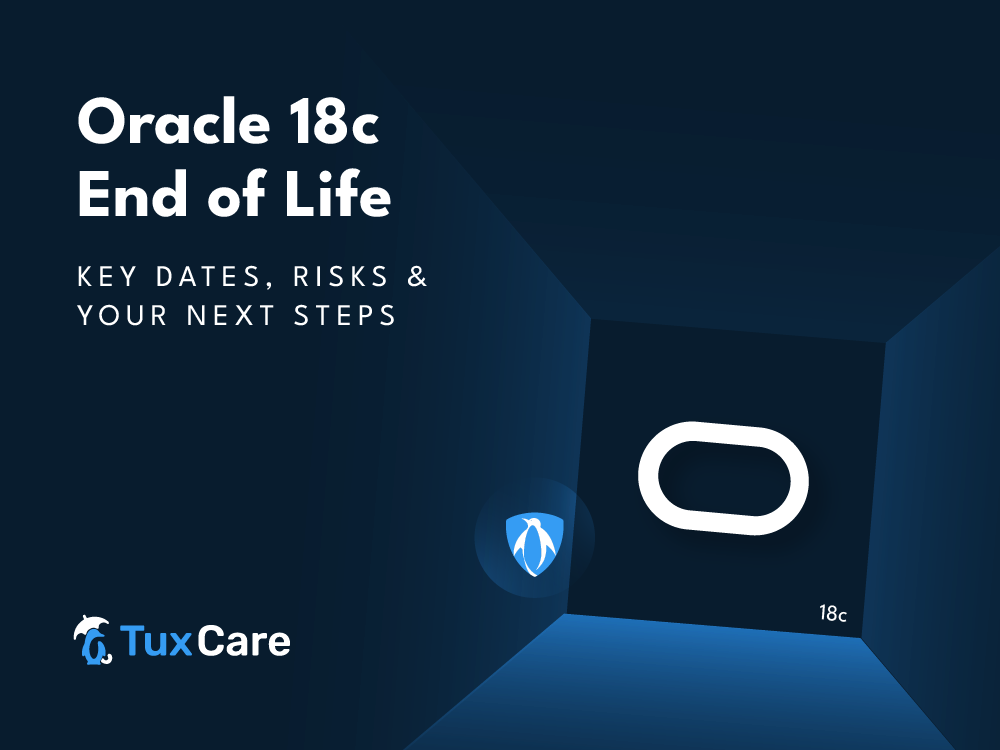Key Takeaways
- Oracle 18c is fully out of support — Premier Support ended in 2021, and Extended Support is not available.
- Running Oracle 18c today means no official security patches, bug fixes, or compliance coverage for your database.
- Many Oracle 18c deployments run on Oracle Linux 7, which is also past its Premier Support phase.
- To stay secure and compliant, you need to upgrade or secure your infrastructure using third-party extended support.
Oracle Database 18c reached end of life (EOL) in June 2021, marking the end of critical patch updates, bug fixes, and other updates from Oracle support. Without vendor support, you are exposed to growing security risks, compliance violations, and inevitable software compatibility issues.
In this article, we’ll explain the key risks of using Oracle 18c post-EOL and walk you through your best next steps to stay secure and compliant.
Oracle 18c End of Life Timeline: Key Dates You Need to Know
Oracle follows a defined support lifecycle for its database releases. Long-Term Releases (LTR) typically receive 5 years of Premier Support, followed by 3 years of Extended Support. Innovation Releases, on the other hand, are designed for rapid adoption of new features and receive at least 2 years of Premier Support, but no Extended Support.
It’s important to note that Oracle occasionally adjusts support durations. For example, the latest LTR, Oracle 23ai, is set to receive 8 years of Premier Support.
Oracle Database 18c, an Innovation Release, was released on July 23, 2018. Its Premier Support officially concluded on June 30, 2021.
Your Options Post-Oracle 18c EOL: Staying Secure and Compliant
After Oracle 18c reached its end of life, maintaining security and compliance is a major concern for enterprises. Primarily, there are two common strategic options to address your database’s unsupported status and secure your environment, which we will explore in detail below:
Upgrade to Oracle 19c
The most direct upgrade path from Oracle 18c is to Oracle 19c, which is a Long Term Release (LTR). Premier Support for Oracle 19c extends until December 31, 2029, and it also receives Extended Support from Oracle support until 2032.
Upgrading to 19c or a newer supported version ensures that you continue receiving official updates, including critical security patches, bug fixes, and feature improvements directly from Oracle. This is the long-term solution for direct vendor support.
Use Third-Party Extended Support
As Oracle 18c is an Innovation Release, it is not eligible for official Extended Support from Oracle. However, some specialized third-party vendors do offer extended support services for older Oracle Database versions, including Oracle Database 18c.
By opting for such extended support, organizations can maintain a level of security and compliance for the database application without rushing the migration or upgrade process.
This can be a strategic decision if you are not ready to migrate yet or require more time to plan a comprehensive database transition.
Upgrade or Risk It? What Happens If You Do Nothing
Choosing to do nothing about your Oracle 18c database after its end of life is not a viable strategy; it puts your entire system, from the Oracle database to its underlying infrastructure, at severe and escalating risk.
Without continuous vendor support, your environment becomes a prime target for various threats and operational issues that directly impact data integrity, operational continuity, and your overall security posture.
Here are the critical consequences of inaction:
- Security Breaches: With no new security patches, known vulnerabilities remain open, making your data and systems highly susceptible to exploitation, ransomware, and unauthorized access.
- Audit Failures & Compliance Gaps: Meeting regulatory requirements (like PCI DSS, HIPAA, or GDPR) becomes challenging without official vendor support. This can lead to significant fines, reputational damage, and failed certifications.
- Software Incompatibility: Your Oracle 18c database, along with its dependent Oracle tools, plugins, and crucial third-party applications, may become unsupported. This can lead to system instability, critical errors, and a breakdown in core business processes.
- Increased Future Costs: Delaying necessary upgrades or mitigation strategies often results in far more expensive emergency fixes, significant downtime to address a breach, and a higher overall cost of resolution and recovery later on.
Your OS May Be End of Life Too: A Compounding Risk
The End of Life for Oracle 18c doesn’t just affect the database application itself; it creates a cascade of risk across your entire software stack. Oracle 18c is commonly deployed on Oracle Linux 7 or newer, as it is supported starting from Oracle Linux 7.
If you are running Oracle 18c on Oracle Linux 7, you are now likely exposed at both the OS and database level. This compounded vulnerability significantly elevates your entire system’s security risk, stability, and performance.
Oracle Linux 7’s Premier Support ended on December 31, 2024, which means you’re no longer receiving regular security patches for the OS — unless you’ve purchased Extended Support. Oracle offers Extended Support until June 30, 2028, however this can often be costly and restrictive for many enterprises.
Without active support for your operating system, known vulnerabilities within the kernel, system libraries, and other core components go unpatched, leaving your entire server susceptible to attacks that could compromise your database and data.
This is where TuxCare provides a vital, cost-effective solution for Oracle Linux 7, delivering essential vulnerability patches and support for as long as needed after the vendor-supported lifecycle.
TuxCare’s Endless Lifecycle Support: An Affordable Alternative for Oracle Linux
It’s important to clarify: TuxCare currently does not provide direct support for the Oracle Database application. However, we offer Endless Lifecycle Support (ELS) specifically for your end-of-life Oracle Linux 6 and Oracle Linux 7 systems.
Unlike Oracle’s Extended Support, TuxCare’s ELS offers a more affordable and flexible alternative, providing continuous vulnerability patching for your OS for as long as your enterprise requires.
Our comprehensive ELS covers more than 130 packages, including critical components like the Linux kernel, glibc, OpenSSL, Python, PHP, Apache, MySQL, and many more. Check out our ELS Projects for a complete list.
By securing your Oracle Linux operating system, TuxCare helps you mitigate a significant portion of the risk associated with running an EOL Oracle 18c environment. This buys your organization crucial time to plan and execute a seamless migration to the latest major release, all while maintaining compliance and significantly reducing the overall attack surface of your critical infrastructure.
Don’t Let Oracle 18c EOL Put Your Systems at Risk
Oracle 18c’s end of life doesn’t have to compromise your entire environment. While a full database upgrade remains the ultimate long-term solution, it’s a complex process that takes time.
Whether you are actively planning that upgrade or simply need to buy time, it’s critical to keep your Oracle Linux systems protected. With TuxCare’s Endless Lifecycle Support (ELS), you can continuously patch critical vulnerabilities and maintain compliance for Oracle Linux 6 and 7 — even after Oracle’s support has ended.
Explore the full risk landscape and mitigation strategies in our in-depth article, The Risks of Running an End-of-Life OS.



 Documentation
Documentation Login
Login





